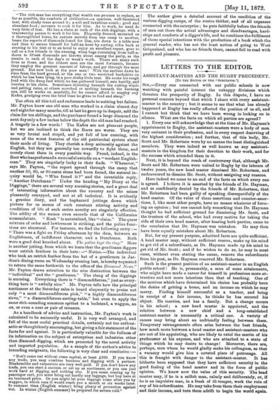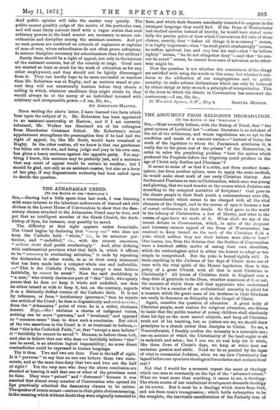LETTERS TO THE EDITOR.
ASSISTANT-MASTERS AND THE RUGBY PRECEDENT. [TO THE EDITOR, OF THE "Srscraroa.'] SIR,—Every one connected with our public schools is now watching with painful interest the unhappy divisions which threaten the prosperity of Rugby. In this dispute, I have no personal concern beyond that which I share with every assistant- master in the country ; but it seems to me that what has already happened at Rugby has really affected the position of us all, and I cannot but think that we have been wrong in looking on in silence. What are the facts on which all parties are agreed?
1. Every one will acknowledge that at the time of Mr. Hayman's appointment to Rugby, the assistant-masters were a body of men very eminent in their profession, and in every respect deserving of the highest consideration ; and further, that of this body, Mr. Scott and Mr. Robertson were by no means the least distinguished members. They were indeed as well known as any assistant- masters in the kingdom for their devotion to their work, and for the success which attended them in it.
Next, it is beyond the reach of controversy that, although Mr. Scott and Mr. Robertson were united to Rugby by the labours of twelve years, the new head master dismissed Mr. Robertson, and endeavoured to dismiss Mr. Scott, without assigning any reasons.
Here indeed we come to an end of the facts on which every one is agreed. I believe it is asserted by the friends of Dr. Hayman, and as confidently denied by the friends of Mr. Robertson, that Mr. Robertson had been guilty of speaking disrespectfully of the head master. Of the value of these assertions and counter-asser- tions, I, like most other people, have no means whatever of form- ing an opinion ; but one cannot help remarking that Dr. Hayman thought he had sufficient ground for dismissing Mr. Scott, and the trustees of the school, who had every motive for taking the side of their own head master, after hearing both parties, came to the conclusion that Dr. Hayman was mistaken. He may then have been equally mistaken about Mr. Robertson.
But, for my present purpose, admitted facts are quite sufficient. A head master may, without sufficient reason, make up his mind to get rid of a subordinate, as Dr. Hayman made up his mind to get rid of Mr. Scott ; and if he wishes to do so, he may in most cases, without even stating the cause, remove the subordinate from his post, as Dr. Hayman removed Mr. Robertson.
Such is the present position of an assistant-master in an English public school ! He is, presumably, a man of some attainments, who might have made a career for himself in professions more at- tractive and not more laborious than that of teaching. One of the motives which have determined his choice has probably been the desire of getting a home, and an income on which he may marry. Finding himself successful as a teacher, and being in receipt of a fair income, he thinks he has secured his object. He marries, and has a family. But a change occurs in his school ; a new head master is appointed, and the relation between a new chief and a long-established assistant-master is necessarily a critical one. A variety of causes may bring about an unfriendly feeling between them. Temporary estrangements often arise between the best friends, how much more between a head master and assistant-masters who are not of his appointing, who are likely to extol the merits of his predecessor at his expense, and who are attached to a state of things which he may desire to change ! Moreover, there are, perhaps, men whom he would gladly make his colleagues, so that a vacancy would give him a coveted piece of patronage. All this is fraught with danger to the assistant-master. It has hitherto been supposed that they have sufficient security in the good feeling of the head master and in the force of public opinion. We know now the value of this security. The head master may, if he is a selfish man, calmly and deliberately, or, if he is an impulsive man, in a freak of ill-temper, work the ruin of any of his subordinates. He may take from them their employment and their income, and turn them adrift to begin the world again.
And public opinion will take the matter very quietly. The public cannot possibly judge of the merits of the particular case, and will most likely content itself with a vague notion that such arbitrary powers in the head master are necessary to secure sub- ordination and discipline among the assistant-masters. And yet no such powers are conferred on colonels of regiments or captains of men-of-war, whose subordinates do not often prove refractory. Is stricter discipline necessary for schoolmasters than for soldiers?
Surely there should be a right of appeal, not only in the interest of the assistant-masters, but of the country at large. Good men are wanted as least as much for the work of education as for any other employment, and they should not be lightly discouraged from it. They can hardly hope to be more successful as teachers than Mr. Robertson was at Rugby, and as matters stand at pre- sent they will not unnaturally hesitate before they choose a ,calling in which, whatever excellence they might attain to, they would always be at the mercy of an individual invested with arbitrary and irresponsible power.—I am, Sir, &c.,
AN ASSISTANT-MASTER.
Since writing the above letter, I have learned two facts which bear upon the subject of it. Mr. Robertson has been appointed `to an assistant-mastership at Harrow, and if I am correctly informed, Mr. Walker has dismissed six of his colleagues 'from Manchester Grammar School. Mr. Robertson's recent appointment strengthens the presumption that if he had had the right of appeal, he, like Mr. Scott, would have remained at Rugby. In the other matter, all we know is that one gentleman has fallen out with six, and being judge and jury in his own case, has given a heavy sentence against the opposite party. For any- -thing I know, this sentence may be perfectly just, and a sentence that any court of appeal would be certain to confirm ; but I should be glad, not only as an assistant-master, but also as a lover ,of fair play, if any dispassionate authority had been called upon 'to decide the question.



































 Previous page
Previous page